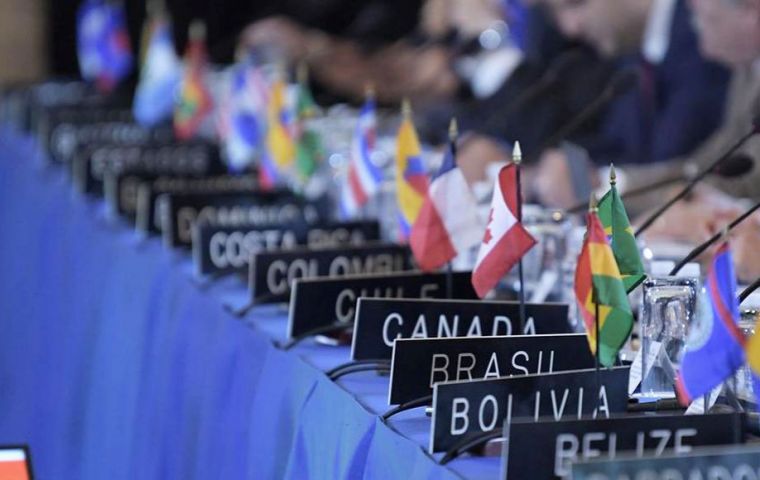MercoPress. South Atlantic News Agency
When 26 OAS countries condemned human rights violations in Nicaragua, Argentina was among the 5 who abstained
 Among those arrested by Ortega are the very partners that helped him overthrow dictator Anastasio Somoza
Among those arrested by Ortega are the very partners that helped him overthrow dictator Anastasio Somoza A resolution by the Organization of American States (OAS) condemning human rights violations and massive arrests of opposition leaders by Nicaragua was supported by 26 countries, opposed by three (one of them Nicaragua), while five nations abstained from voting either way. Argentina was one of them.
Joining Argentina's “neutral” stance were Belize, the Dominican Republic, Honduras and Mexico.
Among those behind the condemnation were the United States, Chile, Colombia, Uruguay and Peru, who demanded “the immediate release of the presidential candidates and all political prisoners.”
“Uruguay rejects the arrest and criminal prosecution to which opposition political leaders and possible candidates have been subjected,” says a statement from the Foreign Ministry issued Tuesday, with almost five months remaining until the presidential elections of November 7 in which President Daniel Ortega, in power since 2007, seeks new reelection.
Along these lines, “Uruguay urges the Nicaraguan government to immediately release the detained persons and to take the pertinent measures to carry out a democratic and internationally recognized process, within the rule of law and with a full separation of powers, as established by it has been requested through the Resolution adopted by the OAS today.”
The OAS resolution on Tuesday that “unequivocally” condemned the arrest of opponents of the Ortega government, and called for the “immediate release of the presidential candidates and all political prisoners” in that Central American country.
The text was approved by 26 votes during an extraordinary session of the OAS Permanent Council. Nicaragua, Bolivia and Saint Vincent and the Grenadines voted against, while Argentina, Belize, Dominica, Honduras and Mexico abstained.
The Nicaraguan Police, led by Francisco Díaz, a brother-in-law of President Ortega, arrested six Sandinista dissidents this weekend, including former guerrillas Dora María Téllez and Hugo Torres, and former Vice Chancellor Víctor Hugo Tinoco. It also keeps under arrest the presidential candidates of the opposition Cristiana Chamorro, Arturo Cruz, Félix Maradiaga and Juan Sebastián Chamorro García.
Twelve of the thirteen detained opponents, including three of the four candidates to the Presidency, are being investigated for “inciting foreign interference in internal affairs” and “requesting military interventions” against the Ortega government, among other crimes.
“Any attempt by a national or foreign actor to undermine an investigation of this nature must also be considered in the context of current legislation, and must be perceived as a frontal attack against the principles of respect for the rule of law, democracy, national sovereignty and free self-determination in Nicaragua,” local authorities have said.
Téllez, a former Sandinista guerrilla, will remain in prison for 90 days for “inciting foreign interference.” She and Tamara Dávila will remain in prison for up to 90 days under the accusation of “inciting foreign interference in internal affairs” and “requesting military interventions” against the Government of Daniel Ortega, it was announced by the Ortega regime.
The Prosecutor's Office indicated that the judiciary, under Ortega's total control, admitted the request for an extension to 90 days of the deadline for the complementary investigation during a special hearing on constitutional guarantees and issued a “judicial detention” for three months against the two opposition leaders.
Over the past weekend, the Police arrested six Sandinista dissidents who are part of the leadership of the Unión Democrática Renovadora (Unamos), formerly called the Movimiento Renovador Sandinista (MRS), a split from the ruling Sandinista National Liberation Front (FSLN).
Among those apprehended is former Vice-Chancellor Víctor Hugo Tinoco and also former guerrilla Hugo Torres, who along with Téllez and others participated on August 22, 1978, in the Sandinista command that took the National Palace by storm and took the legislators related to the National Palace hostage, while overthrowing dictator Anastasio Somoza Debayle almost 42 years ago.
Relatives of the ex-guerrilla, as well as Vigil, denounced that the women were victims of abuse during their arrest and search of their home, which they described as “totally arbitrary and violent.”
“The Orteguista Police deployed an absurd militarized operation, which included more than 60 riot police, four patrols, para-police vehicles, and other unidentified civilians who constantly surrounded the neighbourhood,” they said, in a story shared with journalists.
“They shot a gun at a person and threatened to kill the four dogs in the house. The riot police then beat Ana Margarita, then grabbed Dora María by the hair and hit her in the stomach, handcuffed them and got into a vehicle that people could not see,” it vas reported.
“Both opponents were threatened with a firearm and beaten by police officers,” witnesses have said.
The lawyer for the National Unit Roger Reyes said that Téllez and Vigil, as well as the rest of the opponents captured in the last two weeks, can be considered as “disappeared” since nothing is known about them.




Top Comments
Disclaimer & comment rulesCommenting for this story is now closed.
If you have a Facebook account, become a fan and comment on our Facebook Page!